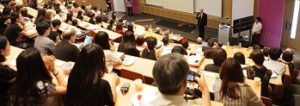It was the snoring that actually caused the problem.

Had he not snored, had he just slept quietly at the back of the lecture hall, the entire incident would have unfolded in a different way. As it was, the professor felt that the student was taking up a place in the university that so many other more worthy applicants would have benefited from. This particular lecture was, as was totally recognised by the rest of his attendees, a pivotal one. Whether it was the feeling that the young man was depriving someone of the opportunity or simply the embarrassment he felt when the sound from the back of the room turned heads and caused a low titter around the room, was debatable. Either way, he made sure his annoyance was voiced when the last slide finished and students began making their way out.
He approached the student, who seemed to be slowly taking in his surroundings. He berated the young medical student the way any professor of medicine would. Pointing out what a waste of space he was and how important it was to attend lectures in a fit state. He also forcefully explained that it was also the professor’s importance in this student’s life that was not fully recognised. The admonishment went on until the student became teary, at which point the professor felt that he had said enough. In an angry mood he abruptly left the lecture room, leaving the offending student to gather up his books. Some of which had fallen to the floor.
It came as a shock to the professor on the following day to note that the student was missing from his class, being convinced that his hefty dressing down would have had quite the opposite effect. It was not until late in the afternoon that he had an even greater shock when he received the news that the student in question had passed away.
After making enquiries, he learnt the student had suffered from a medical condition. It had been sickle cell anaemia, a case of irregular sickled cells blocking blood vessels causing tissue and organ damage, along with a number of symptoms, including daytime sleepiness.
The professor asked himself whether he had been too harsh. Did this in some way have an unseen effect on the boy’s health or did the medical condition simply run its natural course? He came to the conclusion that the latter was bound to be the case.
At which point, he decided that he would keep telling himself that.